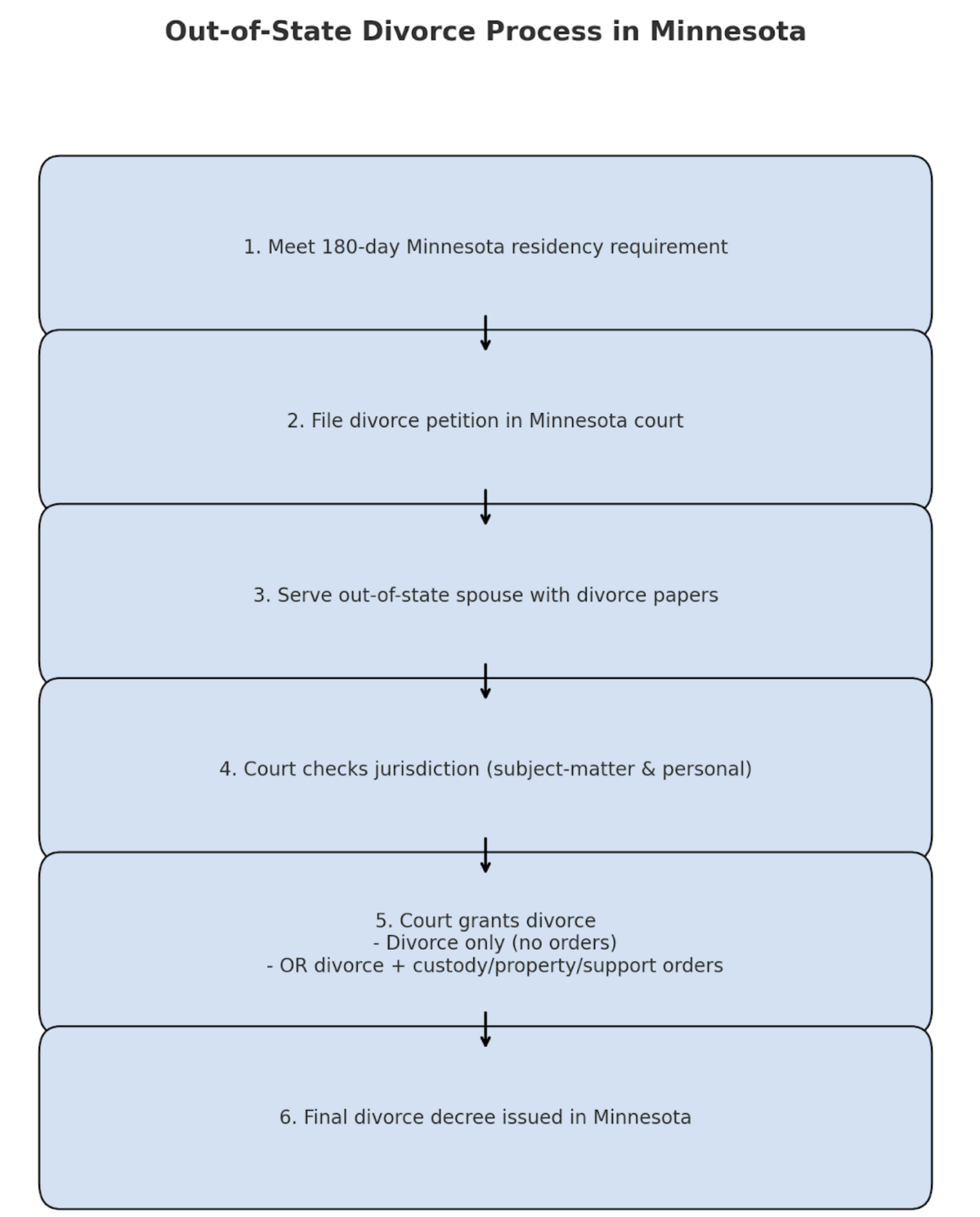Yes, you can get a divorce in Minnesota even if your spouse lives in another state. Minnesota courts allow you to move forward as long as you meet residency requirements and follow the correct legal procedures for serving your spouse.
While it may sound complicated, the law provides a clear process for these situations, but the good news is that you don’t have to go through it alone. Call Martine Law atornyes today and get your divorce settled with the best possible resolution for your case.
What Are Minnesota’s Divorce Residency Requirements?
To file for divorce in Minnesota, you or your spouse must have lived in the state for at least 180 days before starting the case. This is known as the residency requirement.
Without this requirement, Minnesota courts do not have the authority to hear your case. Once met, you can file in the county where you or your spouse resides.
How Does an Out-of-State Divorce Legally Work in Minnesota?
Filing for divorce with an out-of-state spouse involves two key legal concepts:
- Subject-Matter Jurisdiction
This refers to the court’s power to hear the case. Subject-matter jurisdiction is satisfied as long as one spouse meets the 180-day Minnesota residency requirement. - Personal Jurisdiction
This is the court’s authority over your spouse. Minnesota courts can legally dissolve the marriage even if your spouse lives elsewhere. However, to issue enforceable orders for spousal maintenance, child support, or property division, the court must have personal jurisdiction over your spouse. This may require demonstrating that your spouse has sufficient connections to Minnesota.
How to Serve Your Out-of-State Spouse
Once you file for divorce, your spouse must be legally “served” with the papers to give them proper notice. For out-of-state cases, this is usually handled by a professional process server or sheriff in your spouse’s state of residence.
Proper service ensures your spouse is aware of the proceedings and has the opportunity to respond. If service is not done correctly, your case may be delayed or dismissed.
Call our local experienced lawyers specialized in divorce and get a favorable resolution.
About the 180-Day Minnesota Residency Requirement
The 180-day rule exists to prevent people from “forum shopping” for a favorable state. Minnesota courts require at least six months of residency to ensure that the state has a legitimate interest in your case.
If you have recently moved, you may need to wait until the 180-day period is complete before filing.
What Does Being a “Resident” Mean in MN?
In Minnesota, being a resident means more than just staying in the state temporarily. Courts look at factors such as:
- Where you maintain your home
- Where you are employed
- Where you pay taxes
- Whether you intend to stay in Minnesota long-term
These factors show the court that Minnesota is your true home state for divorce purposes.
What Should You Do If You’re Facing an Out-of-State Divorce?
Divorces involving spouses in different states can be more complex than typical cases. You may face challenges like:
- Coordinating legal service across state lines
- Determining jurisdiction for support or property division
- Handling travel for court appearances if required
The best step you can take is to consult with a Minnesota divorce lawyer who understands these unique issues.
Common Outcomes and Challenges
Here are some scenarios you might encounter in an out-of-state divorce:
- Divorce only: The court grants the divorce but cannot issue property, custody, or support orders without jurisdiction over your spouse.
- Full divorce with orders: If Minnesota has personal jurisdiction, the court can decide spousal maintenance, custody, and property matters.
- Delayed resolution: Service issues or jurisdiction disputes can slow down the process.
Understanding these possibilities prepares you for what may lie ahead.
Overview of the Divorce process when one spouse is out of state

Do You Need a Lawyer for an Out-of-State Divorce in Minnesota?
While Minnesota law does not require you to have a lawyer, an attorney can make the process far less stressful. A local lawyer can:
- Ensure your case is filed in the right court
- Handle complex jurisdiction issues
- Make sure your spouse is properly served
- Advocate for your rights in property, custody, and support matters
When your spouse lives in another state, having experienced representation is especially important.
Need Help with an Out-of-State Divorce in Minnesota?
If your spouse lives outside Minnesota, you do not have to face this process alone. At Martine Law, our team has the experience to guide you through every step of an out-of-state divorce.
We will work with you to protect your rights, simplify the process, and pursue the best outcome for your family.
Call Martine Law at (866) 865-9734 or schedule a consultation online today.
Key Takeaways
- You can get a divorce in Minnesota even if your spouse lives in another state.
- At least one spouse must meet the 180-day residency requirement.
- Minnesota courts can dissolve the marriage without your spouse’s residency, but personal jurisdiction is required for financial and custody orders.
- Proper service of divorce papers is critical in out-of-state cases.
An experienced Minnesota divorce lawyer can help you handle jurisdiction and enforcement challenges.


